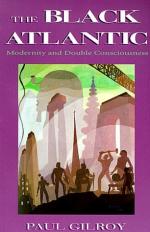
|
| Name: _________________________ | Period: ___________________ |
This test consists of 15 multiple choice questions and 5 short answer questions.
Multiple Choice Questions
1. What primary experience shaped violence in the black community according to Gilroy?
(a) Slavery.
(b) Capitalist exploitation.
(c) Modern marriage.
(d) Factory production.
2. What is the effect of turning toward tradition in Gilroy's account?
(a) Slavery becomes more remote.
(b) Slavery becomes a cultural asset.
(c) Slavery gets repossessed.
(d) Slavery comes into focus as a foundational catastrophe.
3. What does Gilroy say the Afrocentrism movement relies on?
(a) The development of jazz and the blues in America.
(b) A linear period of time interrupted by slavery.
(c) An ongoing civilization in Africa.
(d) A uniquely black culture in England and the U.S.
4. What movement is Richard Wright associated with?
(a) Black power.
(b) Black pacifism.
(c) Pan-Africanism.
(d) Muslim militarism.
5. What did Richard Wright criticize, according to Gilroy?
(a) Capitalism.
(b) Modernity.
(c) Corporate industrialism.
(d) Communism.
6. What did Richard Wright say was the core of modernization?
(a) Racial subordination.
(b) Slavery.
(c) Cheap energy.
(d) Technological exploitation of resources.
7. What does The Souls of Black Folk say to white people according to Gilroy?
(a) It establishes the intellectual credentials of the black races.
(b) It affirms the interrelationship between slavers and slaves.
(c) It proposes that helping the blacks return to Africa is the best path for progress.
(d) It challenges their sense of color-coded civilization.
8. What does the Holocaust help us understood according to Gilroy?
(a) The black experience.
(b) Genocidal terror.
(c) Emotional indifference to suffering.
(d) Tolerance of cultural differences.
9. What theory culminated in the Holocaust?
(a) Messianic theology.
(b) Eugenics.
(c) Evolution.
(d) Egalitarianism.
10. What does Gilroy say about racial traditions?
(a) They are endangered throughout the world, not just in the black Atlantic.
(b) We can regain them if they are still practiced somewhere.
(c) They are the source of all opposition to modernity.
(d) We cannot recover them once they are lost.
11. What is the last period of black history, according to DuBois, in The Souls of Black Folk?
(a) Black self-reliance.
(b) Black music.
(c) Political autonomy.
(d) Returning to Africa.
12. What does Gilroy say tradition helps to do with regard to slavery?
(a) Transform its legacy.
(b) Avoid its memory.
(c) Revise its effects.
(d) Cauterize its pain.
13. What does Gilroy say Richard Wright was ambivalent to?
(a) A closed racial community.
(b) Harmonious coexistence with dominant culture.
(c) Reconciliation with white culture.
(d) Assimilation.
14. Where was W. E. B. DuBois born?
(a) The north.
(b) The south.
(c) Africa.
(d) England.
15. What does Gilroy say is wrong with contemporary criticism of African-American literature?
(a) Relativism.
(b) Essentialism.
(c) Uncritical acceptance of all things primitive.
(d) Over-polarized vocabulary.
Short Answer Questions
1. Who does Gilroy say DuBois was analyzing in The Souls of Black Folk?
2. What does Gilroy say gave Richard Wright his authenticity?
3. How does Gilroy characterize the mood of the black Atlantic?
4. What does music allow black culture to do with this feeling?
5. What does tradition signify in black culture according to Gilroy?
|
This section contains 495 words (approx. 2 pages at 300 words per page) |

|




